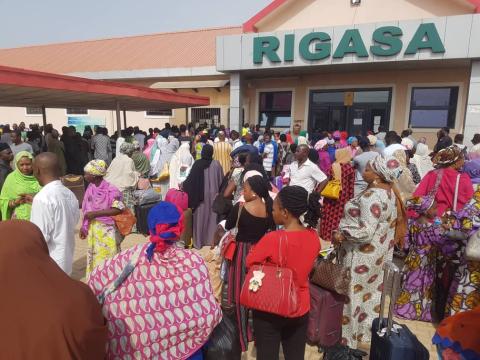
Some of the trains are now a shadow of their former selves due to lack of proper maintenance.
Regular travellers using the Kaduna-Abuja Trains have expressed worries that the rail route, which has been a safer alternative to the bandits-infested Kaduna-Abuja road, is also beginning to feel insecure.
Some travellers told SaharaReporters that they are always apprehensive about the trains developing faults just like one of them reportedly broke down again in the last week of December 2020.

They also noted that the coaches are beginning to look old and in need of maintenance.
“It is a concern because two of the trains have broken down before. One broke down in November and another one broke down during the Yuletide in December. The government needs to ensure more adequate maintenance of the trains. The fear of a train breaking down in the bush, in the middle of nowhere, is real, as bandits are everywhere, including on rail routes,” a traveller, Bako Hassan, said.
“It is corruption. They collect a lot of money from travellers, but they cannot service the trains. This is not proper. The Nigerian Railway Corporation needs to look into the careless attitude of its workers and engineers. Some of the trains are now a shadow of their former selves due to lack of proper maintenance.
“The bandits and kidnappers must be wishing that one day, the trains would break down in a place where they can operate and they would have a field day. The government should not endanger the lives of travellers,” another train user said.
However, a NRC staff member said, “No, it is not true that there is no maintenance. The coaches are new and they are serviced as often as necessary. Sometimes, it is routine maintenance when the trains stop in bush paths. It is for one or two checks and we do usually stop only at the designated points.”
Meanwhile, the estimated cost of the Abuja-Kaduna rail project was $874m (approximately N317.3 billion). China‘s EXIM bank provided $500m as a concessionary loan for the project. The remainder was provided by the Nigerian government.
The Abuja-Kaduna rail project was finalised in 2009. The contract for building the new line was awarded in December 2010. Track laying for the single standard gauge line was officially launched in July 2013.
Just on November 22, 2020, an Abuja-bound train from Kaduna State had broken down with passengers stranded in the bush for hours on that Friday evening.
A video had circulated on social media showing the passengers scattered outside the train, relaxing while the faulty train was being repaired.
The Manager of Rigasa Station, Aminu Ibrahim, said the incident was a mere mechanical fault, which he said was normal for any engine.
The Minister of Transportation, Rotimi Amaechi had disclosed two days later that the locomotives on the Abuja-Kaduna rail route that broke down up to two times would be returned to China.
During an inspection in Lagos on Monday, Amaechi had noted that “it is worrisome that these locomotives that are brand new are failing.”
He explained that the locomotives have a warranty that covers them for over four years, adding that the government was considering returning them to China.
“This will affect the number of times the train will now run on the route,” the minister had stated.
Abuja-Kaduna is a 186km line with standard gauge railway tracks from Idu, near Abuja, to Kaduna in the north-western region of Nigeria.
It has nine stations and features both passenger and cargo trains.
The passenger trains on the line can be operated at a speed between 200km/h and 250km/h. The travel time between Abuja and Kaduna will be reduced to one hour and each passenger train can carry up to 5,000 commuters.